Introduction
A great base from which to customise your bespoke rentals solution.
Features out of the box include…
- Checking the availability of the rentable item
- Disallowing rental start and end dates during live hours with control over extra payments made
- Control over paid locations for item collections
- Rentals can be enabled for minutes, hours, days, weeks or months
- Configurable buffers before and after every rental
- Configurable buffers for rentals starting from now
- A fully translatable interface integrated with RainLab.Translate
- An easily extended, October CMS design, and API.
Third-party dependencies
By default the plugin uses amazing:
Take a look at the Initbiz.LetsRentCars plugin for example extension of this plugin.
The following plugins are required

Translate
Enables multi-lingual websites and translate website contents.
Translate
Enables multi-lingual websites and translate website contents.

Location
Adds location based features, such as Country and State.
Location
Adds location based features, such as Country and State.

Currency
Tools for currency display and conversion
Currency
Tools for currency display and conversion

Money
Easy money management within October
Money
Easy money management within October

InIT DRY
Don’t Repeat Yourself - A great little time saver
InIT DRY
Don’t Repeat Yourself - A great little time saver
This plugin is also included into the following bundle
The following plugin extends or depends on the plugin
Installation via Command Line
php artisan plugin:install Initbiz.LetsRent
Orders
Orders can be created using the CreateOrder component as well as backend controller but there are little differences between those two. While creating order using the component, dates are strictly validated. When you create an order in the backend, dates have to be set wisely. Rentables will still be filtered by availability but dates can be set even in the past. It's just for the convenience of the employees of the rental.
Order price
In every rental office there have to define such constants:
- minimum period for the rental (whether it is 15 minutes, 1 hour, 1 day and so on),
- buffer for all rentals.
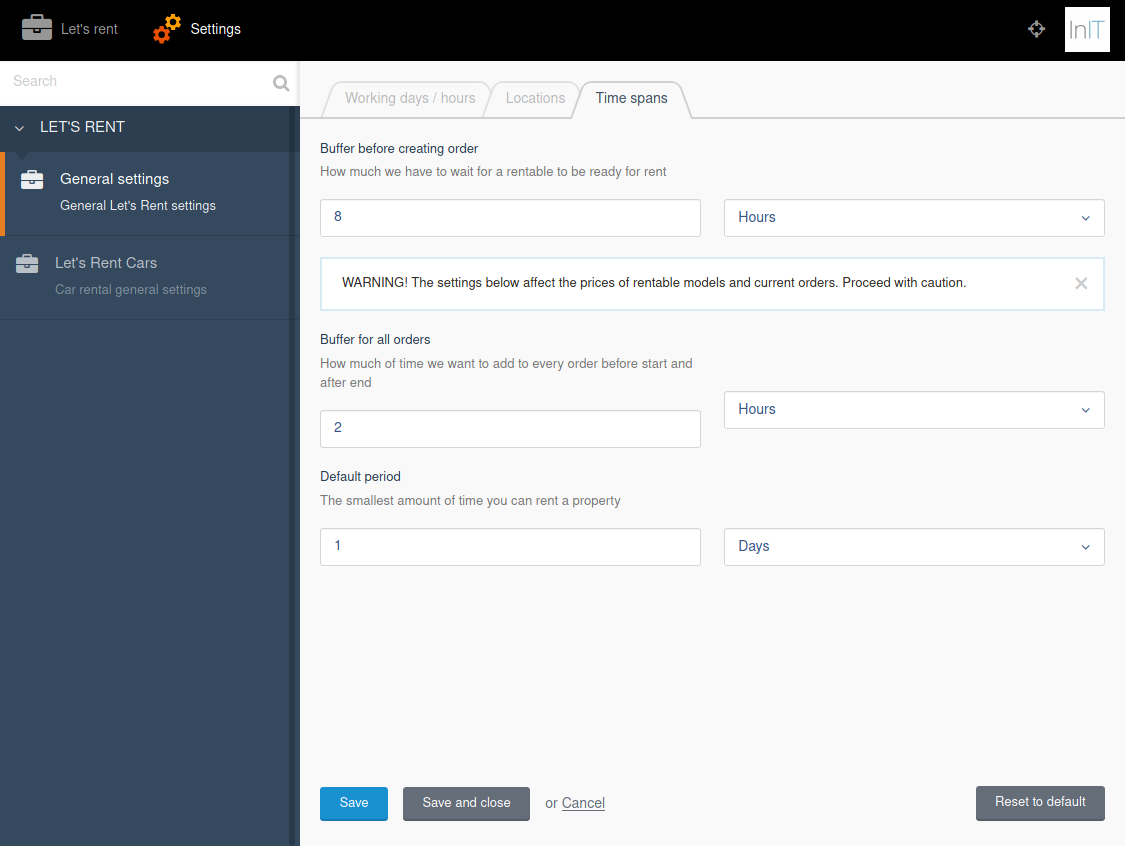
For example, when we have a car rental, we would like to have a minimum period of one day and for example 2 hours of buffer between rentals to prepare cars.
Every price of the rentable models defines the price for the defined period.
In the car rental example where our minimal rental period is one day, in the rental models we give prices for one day.
To calculate the price for the rentable model, by default the Order model is running getPriceCalculatedFor method which is defined in the Rentable behavior. The method by default is multiplying the given price by the count of periods. If you want to give custom logic for the model, you can override the method in the rentable model.
Status and payment status
Payment statuses are:
not_paid,paid,cash_on_delivery
Statuses are:
draft,ordered,in_progress,cancelled,closed
All of them are defined in the Order model and are translated to display nicely for clients.
Additional charges
All additional charges for the order can be added using the setAdditionalCharge method. By default there are for in use:
- Pickup location extra paid,
- Return location extra paid,
- Pickup hour extra paid,
- Return hour extra paid.
Marking an order as paid
It is recommended to use the markAsPaid method from the Order model. The method will save the current date as paid_at and fire event initbiz.letsrent.markAsPaid with the order as a parameter.
Rentables
Rentables are models that can be rent using Let's rent plugin. By design, all rentable models will be attached to the order using dynamic polymorphic many to many relation and be rendered as a tab in the Orders controller.
The availability of the models for the given periods will be automatically filtered using Rentable behavior.
Registering rentables
They have to be registered in the plugin's registration file using the registerRentables method.
For example:
public function registerRentables()
{
return [
'cars' => [
'class' => 'Initbiz\LetsRentCars\Models\Car',
'label' => 'initbiz.letsrentcars::lang.rentables.cars_label',
'description' => 'initbiz.letsrentcars::lang.rentables.cars_description',
'relationConfigs' => [
'view' => [
'list' => '$/initbiz/letsrentcars/models/car/view-columns.yaml',
'recordUrl' => '/initbiz/letsrentcars/cars/update/:id',
],
'manage' => [
'list' => '$/initbiz/letsrentcars/models/car/view-columns.yaml',
'recordUrl' => '/initbiz/letsrentcars/cars/update/:id',
'filter' => '$/initbiz/letsrentcars/controllers/cars/config_filter.yaml',
]
]
]
];
}
By default relation's config does not have to be specified, it will get the default of the
columns.yamlandfields.yaml.
In this example, there is a Car model in the Let's Rent Cars plugin that can be rented using the plugin.
Registering the model as a rentable will make a few things:
- extend the model to implement Rentable behavior (described below),
- extend the model to implement MoneyFields (Initbiz.Money) behavior,
- attach automatically
morphToManyrelation between the model and theOrdermodel
As a consequence, the model has to have currency_id and amount columns in the database:
- amount - unsigned integer nullable
- currency_id - unsigned integer nullable
Rentable model filters
If you want to give the list of rentables ability to filter the records, you can define rentableFilters property of the model. For example:
public $rentableFilters = [
'brand' => [
'label' => 'initbiz.letsrentcars::lang.car.filter.brand'
],
];
Using the codes from the variable, the RentableList component will look for the attribute in the query string (GET) and enable them in scope if the value is proper.
For every filter you should also define method get options method like so:
public function getBrandOptions()
{
return [
'renault' => 'Renault',
'audi' => 'Audi',
'bmw' => 'BMW',
];
}
This way you will be ready for the backend dropdowns and for the filters list to be built.
Rentable behavior
Implementing the behavior will automatically define the dynamic 'price' attribute for columns amount and currency_id.
Disabled models
Rentable models can support disabling the feature.
public $supportDisabling = true;
Ensure you have a boolean is_enabled column in the model's database table.
This will make it possible to use enabled() scope on the model and automatically make disabled models invisible for queries.
Categories
Categories are meant to be used by the plugins extending Let's rent.
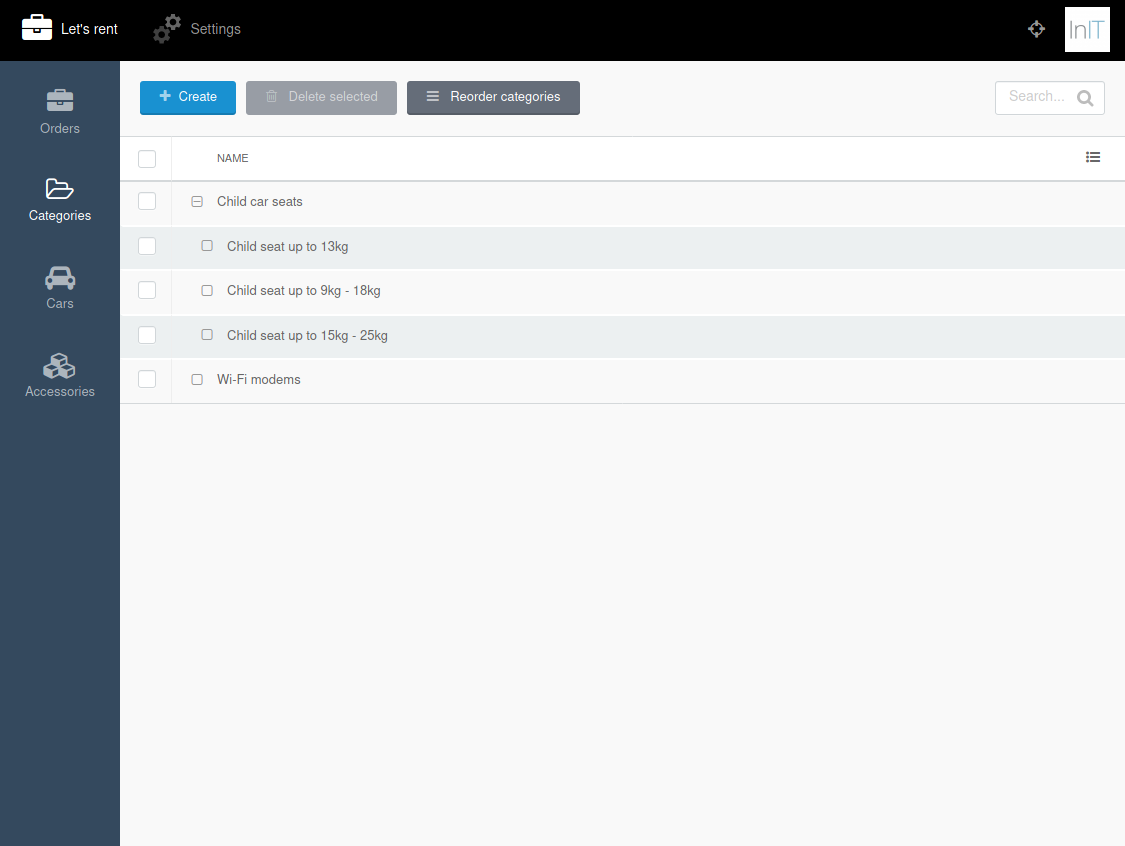
They are created just for the convenience of the rental office employees.
Components
RentableList
This component will render a list of rentables. The only thing you have to do is to select the rentable model from the list in the component's inspector.
By default, the list will have links with URLs to the page with RentableDetails to show the particular rentable.
Using the car rental example, using this component you can render a list of cars
The component will automatically embed the OrderInfo component and make use of it to automatically filter the list using the query string parameters.
The component also supports the AJAXly updated list of filtered elements. It will send AJAX request to onRefreshList handler which returns the filtered list of rentables and updates the partial to div#rentables-list. What is more, it will automatically set the filters in the query string as well as can load default filters from the query string.
RentableDetails
This component will inject the particular rentable object on the page.
Using the car rental example, using this component you can render details of the selected cars
RentForm
The component will render a typical rental form with such parameters:
- Start time,
- End time,
- Start location,
- End location.
Locations will be seeded from the settings and if they are extra paid than the option will have this specified in the parenthesis.
Start and end time will be set to the closest possible time by default and it will be treated as the minimum date in the frontend. If the page remembers the state of the inputs and the date is too early, the alert will be returned:
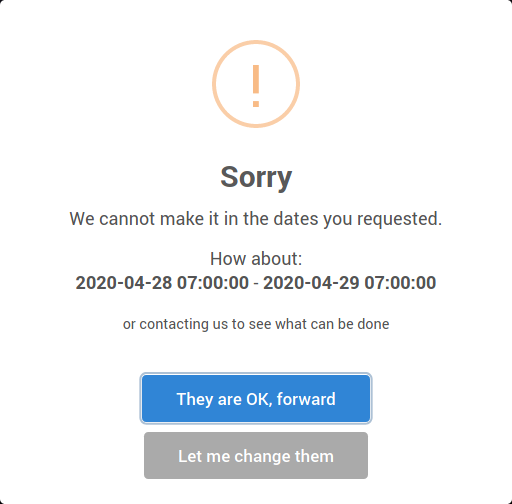
CreateOrder
Using this component you users can create orders. It is getting the order parameters from the query string to initially prepare order:
rentable- code of the rentable being ordered,slugs- slugs of the rentables in the formatslug-1,slug-2,starttime,endtime,startlocation,endlocation,
The scripts loaded by the plugin add feature to automatically send AJAX requests (to onOrderChange) on change for inputs with two classes: refreshing-field and refreshing-field-blur. They both send every field in Order[] namespace to the handler but the first one will send on every change, while the second one only when user leaves the field.
OrderInfo
The component in most cases is used by other components to prepare the order using the query string parameters.
By default it is rendering booking information of the current order, hidden inputs that keep the parameters and displays button if no order is specified.
OrderList
When the user creates order, its ID is kept in a cookie. The list of user's orders can be rendered using this component.
The component can be rendered in a few modes:
- modal
- dropdown
- select input
- list
- button
Button mode is designed to be only a link to a page that shows a list of the orders. In this case, you should embed the component with a different mode on that page.
OrderSummary
The component renders details of the order from the URL parameter. onRun it checks if the user has access to display the order and aborts if not.
The component gives two AJAX handlers:
onTransferonCashOnDelivery
The onTransfer handler gets the orderId from POST and redirects to the paymentPage property with order ID in parameter. It is designed to process payments whatever way you want.
The onCashOnDelivery handler ensures if the user can modify the order and if so, sets payment_status to cash_on_delivery. It is meant to be used by the client who wants to inform the rental office that he/she wants to pay on delivery.
Settings
Working hours
You can specify the working hours for every weekday.
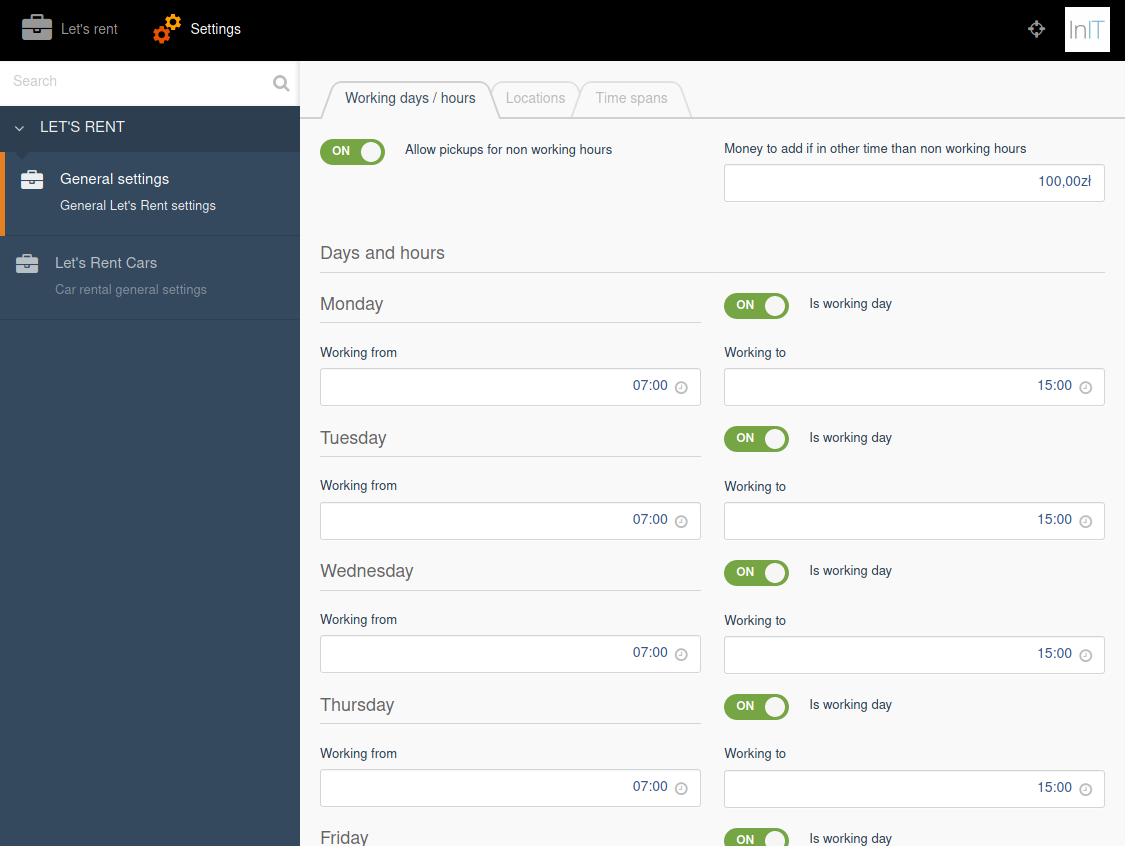
What is more, you can forbid rentals in non-working hours or if you like enable but add the specified amount of money to the order automatically.
Locations
You can manage pick up locations from the settings and specify the amount of money to be added to the order while selecting the location.
Remember to keep the same code for multiple languages
Paid locations will render the amount in the rent form and backend controller options.
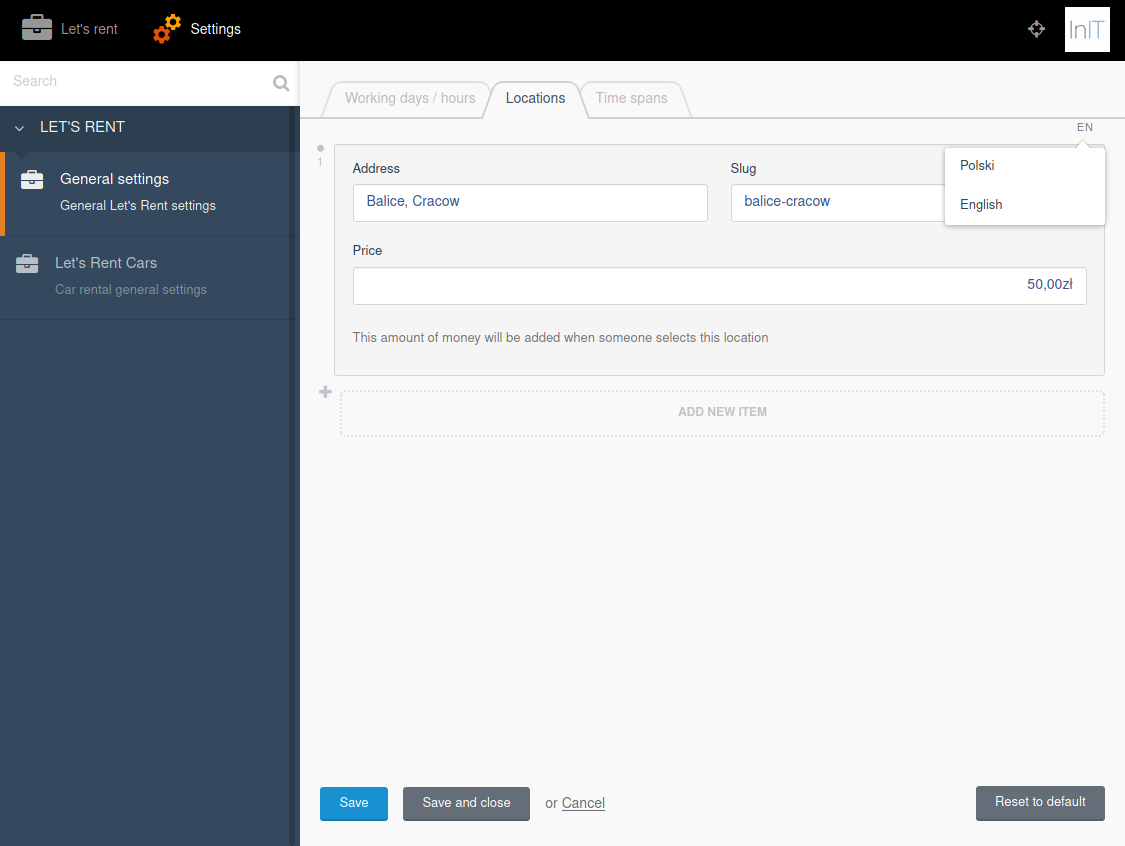
Time spans
The settings are meant to be set before making the app production-ready. They refer to the order price described at the beginning of the document.

Buffer before creating order
The setting describes the time that has to lapse from the time of creating the order for the rentable models to be ready.
For example, if someone wants to create order on Monday at 8:00 a.m. for 8 hours buffer he/she will be able to do that at 4 p.m.
You can override the default behavior using the initbiz.letsrent.orderAfterDateNormalization event.
The following code will make it possible to rent something at the beginning of the next working day:
Event::listen('initbiz.letsrent.orderAfterDateNormalization', function ($order) {
$startsAtNormalized = Session::get('initbiz.letsrent.starts_at_normalized');
$endsAtNormalized = Session::get('initbiz.letsrent.ends_at_normalized');
if ($startsAtNormalized || $endsAtNormalized) {
$settings = Settings::instance();
$closestWorkingDay = $settings->getClosestWorkingDay();
$hours = $settings->getWorkingHours($closestWorkingDay->dayOfWeek);
$closestOpening = Carbon::parse($closestWorkingDay->format('Y-m-d') . $hours['from']);
$order->starts_at = $closestOpening;
$order->ends_at = $closestOpening->modify('+' . $settings->get('count') . ' ' . $settings->get('period'));
}
});
TODO / Future features
- User registration out of the box
-
This plugin has not been reviewed yet.
-
| 1.0.7 |
Make the plugin installable with Money v.2 Aug 12, 2025 |
|---|---|
| 1.0.6 |
Add born_at field in client and fire initbiz.letsrent.orderBeforeAdditionalCharges Sep 24, 2020 |
| 1.0.5 |
Add soft deletes May 06, 2020 |
| 1.0.4 |
Add zip column to clients May 04, 2020 |
| 1.0.3 |
Add description to categories May 04, 2020 |
| 1.0.2 |
Add nesting for categories May 04, 2020 |
| 1.0.1 |
Initial table scheme May 04, 2020 |












